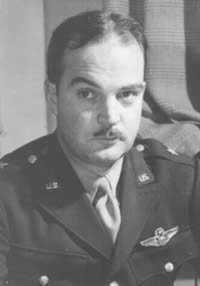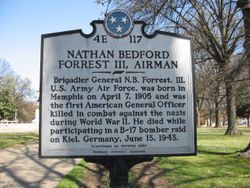(His family was presented his Distinguished Flying Cross, which he was awarded posthumously for staying at the controls of his B-17 bomber while his crew bailed out.[2] The plane exploded before Forrest could bail out. By the time the Seenotdienst (the German air-sea rescue) arrived, only one of the crew was still alive in the water.)
A 1928 graduate of West Point, he served as Second Air Force Chief of Staff prior to transfer to the U.S. Eighth Air Force in England. His body was recovered and buried by the Germans, after washing up at a seaplane base, in a small cemetery in Wier, Germany. He was the great-grandson of Confederate Lt. General Nathan Bedford Forrest. In 1949, his body was returned from Germany and reburied in Arlington at the request of his wife, Frances Brassler Forrest Martin.
This essay was published as a new introduction for Lytle’s Bedford Forrest and His Critter Company and is published here in honor of Forrest’s birthday, July 13.
This is a young man’s book. To have anything more to say about a book you did fifty odd years ago brings you hard up against the matter of time. The young author shows a familiar visage, as enigmatic as the portrait of a great-grandfather “struck” in his youth, gazing into the close air of the parlor. You know you are kin, but that youth belongs to the ancestors. Therefore to redo or revise in any real sense would mean to make another book. Fifty years can change more than the use and control of language. The world may go on for a thousand years and, outwardly at least, be always the same.
Then something appears out of nowhere, so sudden does it seem, and a shattering takes place; as for example when the stirrup was introduced into Russia by the Sarmations riding out of Siberia. They stopped with the conquest of Russia, but the stirrup did not stop there. The Goths took it into Rome.
It ended the stalemate between the mounted archers of Parthia and the Roman legion. It had its long history in Europe. It came to an end as an instrument of military power about a hundred years ago in Alabama.
More @ The Abbeville Institute



My Dad was his top sergeant when they opened and established the airfield at Walla Walla. Showed my Dad some CW documents of his grandfather's; diary pages, orders, etc. Pretty salty and forceful guy, that NBF.
ReplyDeleteHe was the one that recommended my dad for OCS. Dad would retire as a colonel in the USAF in 1965.
Wonderful and do you have more that he wrote down?
DeleteThat was an excellent piece and the gospel truth!
ReplyDeleteDeo Vindice
Amen.
DeleteForrest was my favorite CW general. He was a natural. He was among the most feared commanding officers of the Civil War—Union major general William Tecumseh Sherman once thundered, “that devil Forrest must be hunted down and killed if it costs ten thousand lives and bankrupts the federal treasury.” Much of his success was due to his force of will. He had no military experience and
ReplyDeletebarely had six months of formal education. I hope Sherman's
body has been dug up and tossed somewhere.
Yes, Forrest could have put his shoes under my bed anytime.
Can't remember the exact words, but somebody cut him and seeing it would probably be fatal said 'nobody kills me and lives :)
DeleteWell this is better:) https://civilwartalk.com/threads/no-ed-man-kills-me-and-lives-the-forrest-gould-affair.98639/
Good story. Yes, it was definitely self-defense. Sounds
Deletelike Gould was not REALLY honorable to attempt to shoot an
unarmed man who was in the process of turning away to
depart. Gould, probably from a wealthy family and
very spoiled. Good thing Forrest had excellent reflexes.
Sadly, Forrest died from diabetes. Could not have been
diabetic at the time or else the wound would not have
healed.
Brock, I've posted this on your blog before, but it needs to be published far and wide that, perchance it may dispel some of the abject ignorance and bigotry that abounds toward General Nathan Bedford Forrest, especially here in his home State. This from Tennessee-SCV:
ReplyDeleteA convention and BBQ was held by the Independent Order of Pole-Bearers Association at the fairgrounds of Memphis, five miles east of the city. (July 5, 1875) An invitation to speak was conveyed to General Nathan Bedford Forrest, one of the city's most prominent citizens, and one of the foremost cavalry commanders in the late War Between the States. This was the first invitation granted to a white man to speak at this gathering. The invitation's purpose, one of the leaders said, was to extend peace, joy, and union, and following a brief welcoming address a Miss Lou Lewis, daughter of an officer of the Pole-Bearers, brought forward flowers and assurances that she conveyed them as a token of good will. After Miss Lewis handed him the flowers, General Forrest responded with a short speech that, in the contemporary pages of the Memphis Appeal, evinces Forrest's racial open-mindedness that seemed to have been growing in him.
"Ladies and Gentlemen I accept the flowers as a memento of reconciliation between the white and colored races of the southern states. I accept it more particularly as it comes from a colored lady, for if there is any one on God's earth who loves the ladies I believe it is myself. ( Immense applause and laughter.) I came here with the jeers of some white people, who think that I am doing wrong. I believe I can exert some influence, and do much to assist the people in strengthening fraternal relations, and shall do all in my power to elevate every man to depress none. (Applause.) I want to elevate you to take positions in law offices, in stores, on farms, and wherever you are capable of going. I have not said anything about politics today. I don't propose to say anything about politics. You have a right to elect whom you please; vote for the man you think best, and I think, when that is done, you and I are freemen. Do as you consider right and honest in electing men for office. I did not come here to make you a long speech, although invited to do so by you. I am not much of a speaker, and my business prevented me from preparing myself. I came to meet you as friends, and welcome you to the white people. I want you to come nearer to us. When I can serve you I will do so. We have but one flag, one country; let us stand together. We may differ in color, but not in sentiment Many things have been said about me which are wrong, and which white and black persons here, who stood by me through the war, can contradict. Go to work, be industrious, live honestly and act truly, and when you are oppressed I'll come to your relief. I thank you, ladies and gentlemen, for this opportunity you have afforded me to be with you, and to assure you that I am with you in heart and in hand."(Prolonged applause.)
--Ron W
Yes, but missing the kiss. :)
DeleteNathan Bedford Forrest & The Jubilee of Pole Bearers
http://www.namsouth.com/viewtopic.php?t=141&highlight=forrest
"After the speech Forrest thanked Miss Lewis for the bouquet and kissed her on the cheek. This type of familiarity between the races in public was almost unheard of at the time."
Forrest went thru lots and lots of horses. I feel sorry for the
ReplyDeletehorse that was attached to Forrest:
https://whitebiocentrism.com/viewtopic.php?t=4119&p=15371
Thanks.
Delete